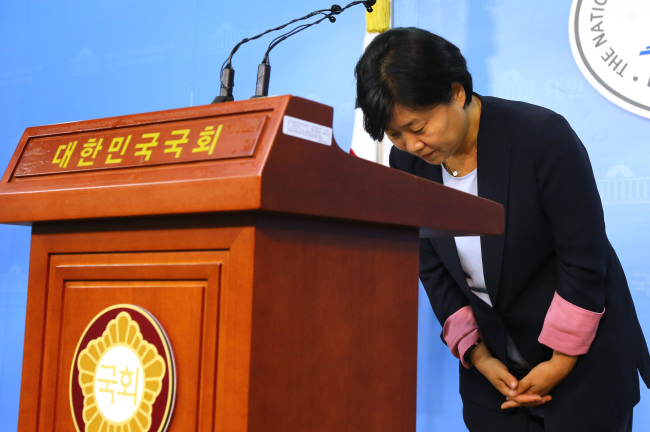The National Assembly on Sunday vowed to establish stricter rules against lawmakers’ hiring of family members as aides amid growing public outrage over the practice.
The Assembly’s Secretary-General Woo Yoon-keun said that by the end of this month the Secretariat would set out a new code of ethics for lawmakers. The legislative body would gather relevant cases, canvass public opinions and propose the plan to parliamentary committees.
The initiative has gained momentum since a number of lawmakers recently came under scrutiny for hiring family members to work at their offices. A total of 30 parliamentary aides have reportedly resigned in the wake.
 |
Rep. Seo Young-kyo. |
Among the hardest-hit is The Minjoo Party of Korea’ Rep. Seo Young-kyo, who is being pressed to resign for hiring her own daughter, brother and another relative during the previous term. Rep. Park In-soon of the Saenuri Party and Chung Dong-young of the People’s Party were implicated in similar allegations.
“I don’t think we should deal with these ethical scandals on an emotional basis,” said the secretary-general. “Over the next two weeks, we are going to collect cases and opinions. I believe we will come up with a new measure no later than this month.”
He added that new regulations should clarify the detailed scope of family and relatives banned from being directly hired by Assembly members, highlighting that there was no specific regulation for the hiring practices, often leading to arbitrary interpretation.
There are clauses in parliamentary regulations related to the lawmaker’s ethical code of conduct, but they only stipulate that the representatives must supervise their aides and staff members and should not use their salary for illegitimate purposes.
Assembly Speaker Rep. Chung Sye-kyun had promised to support the move, saying the plan would soon be submitted to the House Steering Committee. The new measure is expected to be proposed as a parliamentary regulation, not new legislation.
It was not the first time a lawmaker hired a family member. Most parliamentary aides and staff members were family members, relatives or close friends before the 13th Assembly, elected in 1988, adopted a formal hiring process.
“Back in the day, there was no formal recruiting process for parliamentary aides. Since the job involved a high level of confidentiality, family members and close friends have been the ones the lawmakers trust with their jobs,” said a 45-year-old aide who requested anonymity.
The practice persisted throughout the 18th and 19th Assemblies. Including four-term lawmaker Rep. Choi Kyung-hwan who hired his brother-in-law as an aide, more than a dozen lawmakers, crossing party lines, have come under scrutiny for hiring relatives.
In other advanced democracies, rules against nepotism have been addressed and enforced more strongly, such as in the U.S. Congress that stipulates specific cases in which lawmakers are forbidden from hiring relatives.
A section of U.S. federal law covering antinepotism states that public officials shall not hire individuals with certain relationships. They include the official’s aunt, brother, daughter, father, first cousin, grandchild, half-sibling, husband, mother, nephew, sister and son.
Some lawmakers, however, warned that a comprehensive ban on the hiring of relatives would deprive individuals of opportunities to choose their jobs and that competent relative should be given the chance to work unless they are immediate family members.
“Truth be told, some lawmakers might hire family members because they are more competent than any other candidate. In that sense, it can infringe upon the individual’s right to employ and be employed,” said the Minjoo Party’s floor leader Rep. Woo Sang-ho.
By Yeo Jun-suk (
jasonyeo@heraldcorp.com)








